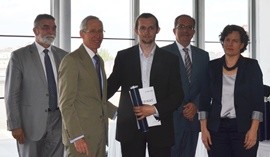
For Immediate Release
BELGRADE – Ambassador Michael D. Kirby, Deputy Prime Minister Kori Udovički and President of the Standing Conference of Towns and Municipalities (SCTM) Zoran Perišić presented certificates to 61 officials from 22 municipalities throughout Serbia today. These local officials successfully finished the e-learning program whose goal was to gain the knowledge and skills needed to better manage economic development in their communities, attract new local and foreign investments, and create jobs.
Speaking at the award ceremony, Ambassador Kirby said, “Increased investments and new jobs are only achieved when municipalities partner with business. Businesses create jobs, while the role of local government is to create the conditions for businesses to do this more easily – by streamlining administrative processes and making them as transparent as possible.” He added, “We look forward to continuing our work with the SCTM and local economic development teams to improve the competitiveness of their municipalities and regions and to speed the path of successful EU integration.”
USAID Sustainable Local Development Project assisted SCTM in implementing a comprehensive learning program for newly elected/appointed local government and local economic development (LED) officials. The program entitled “LED-Educational Response” began in May 2013.
The one-year program, funded through USAID assistance of approximately $120,000, consisted of a combination of training sessions, coaching and internet-based distance-learning. Officials from 32 partner local governments from eight Inter-Municipal Cooperation areas – led by Subotica, Novi Sad, Zrenjanin, Niš, Vranje, Užice, Kraljevo and Novi Pazar – participated in the program (for a detailed list of municipalities please visit http://lokalnirazvoj.rs/en/about/where-we-work). They learned about the legal and institutional context of local government economic responsibility, instruments for managing LED, private sector development, investment attraction, and public-private partnerships.
Over 140 local officials participated in regional trainings, while roughly 80 took part in the distance-learning program implemented from January to April 2014. Sixty-one local officials from 22 municipalities successfully completed the distance-learning program.
Distance learning, or e-learning, is still a relatively new method of study for local governments in Serbia. It has proven to be an efficient way of knowledge sharing, enabling participants to study on their own time, while having continuous mentor support and interaction with other study group members through on-line forums. Compared to traditional studying, distance learning enables a larger number of participants from different locations to partake in the program at the same time. It also allows for significant financial savings and shortens the time between the commencement of study and the practical use of acquired knowledge.







Comment
Make a general inquiry or suggest an improvement.